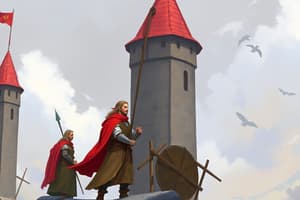Podcast
Questions and Answers
What was the main basis of Feudalism in Europe?
What was the main basis of Feudalism in Europe?
- Trade and commerce
- Landowning, loyalty, and power of knights on horseback (correct)
- Religious beliefs
- Development of technology
Who gave estates to nobles that fought for him in Europe during the Middle Ages?
Who gave estates to nobles that fought for him in Europe during the Middle Ages?
- Peasants
- Knights
- Charlemagne
- Charles Martel (correct)
What happened when Charlemagne’s empire collapsed in Europe?
What happened when Charlemagne’s empire collapsed in Europe?
- Peasants gained power
- Trade routes expanded
- Lords became serfs
- Landowning nobles gained the right to collect taxes and impose laws (correct)
What was the main role of a vassal in the feudal system?
What was the main role of a vassal in the feudal system?
What did knights fight on during feudal times?
What did knights fight on during feudal times?
What was a vassal who fights for his lord known as?
What was a vassal who fights for his lord known as?
What type of armor did knights typically wear during feudal times?
What type of armor did knights typically wear during feudal times?
What was the main expectation in the Japan feudal system towards the Samurai and Shogun?
What was the main expectation in the Japan feudal system towards the Samurai and Shogun?
"Stirrups" were mainly used for:
"Stirrups" were mainly used for:
"Crop rotations" during feudal times helped to:
"Crop rotations" during feudal times helped to:
Flashcards are hidden until you start studying
Study Notes
Development of Feudalism
- Originated in Europe during the Middle Ages, based on landowning, loyalty, and the power of knights on horseback
- Charles Martel granted estates to nobles who fought for him, leading to a new way of organizing society that spread across Europe
Feudal Structure
- Europe divided into many feudal territories, with lords and vassals
- Nobles held dual roles as both lords and vassals
- Vassals swore an oath of loyalty to their lord, serving in their army and receiving land (fief) in return
Knights and Fiefs
- Knights fought on horseback, wearing coats of mail armor made of metal links
- Fief: land granted to a vassal, governed by the vassal
The Manorial System
- Lands on fiefs were called manors, ruled by the lord
- Peasants: free men who paid fees to nobles to farm land
- Serfs: tied to the manor, unable to leave, own property, or marry without approval
- Serfs worked 3 days/week for the lord and the rest for themselves, gave a portion of crops to the lord, and paid for using mill, bread oven, and wine press
Inventions and Technology
- Stirrups: invented for knights on horses
- Mills powered by water, used to grind grain
- Windmills: used for pumping water, grinding grains, and cutting wood
- Crop rotations: kept soil fertile
Code of Chivalry
- Became the guide to good behavior, influencing modern ideas about manners
- Emphasized charity, respect towards women of noble birth, honor, and honesty
Studying That Suits You
Use AI to generate personalized quizzes and flashcards to suit your learning preferences.




